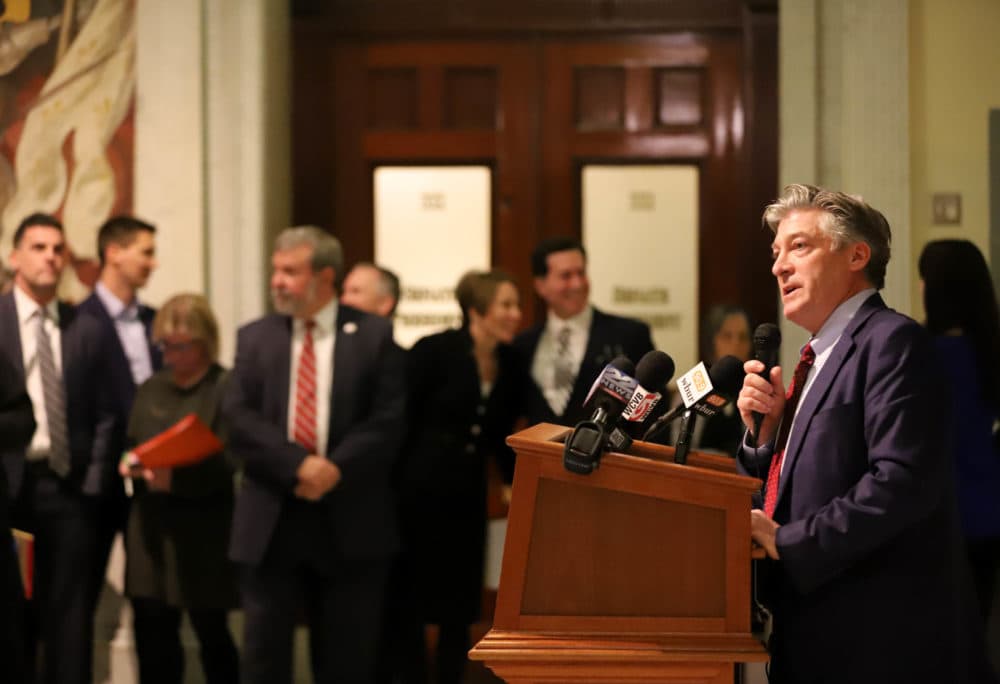Advertisement
Mass. Commission Studying Language Of Campaign Finance Amendment

In the decade before the U.S. Supreme Court's 2010 Citizens United v. FEC decision, spending on Massachusetts elections and ballot initiatives totaled $260 million. In the decade since the ruling, Massachusetts political spending soared to $700 million.
Those figures are one example of many a commission offered in a new report to describe the growing role of money in politics. The Citizens United case, commissioners say, opened the door for a flood of spending that has altered the dynamics of democracy.
Massachusetts voters approved a ballot question by a 71% to 29% margin in 2018, creating a Citizens Commission and tasking it with recommending how the state can support U.S. constitutional amendments limiting the role of money in politics and the influence of corporations.
At an event marking release of the commission's first report, co-chair Costas Panagopoulos said the panel is not ready to propose specific language for a constitutional amendment but that members agree about its importance.
"It may be our last, best hope to restore sensible campaign finance regulation and to rescue American democracy from the corporate stranglehold currently choking it," Panagopoulos, who chairs Northeastern University's political science department, said.
The commission found that political spending is significantly stratified with the bulk coming from large-dollar donors and outside groups.
In 2018, according to data from the Center for Responsive Politics the commission cited, 0.47% of the American population made political contributions of $200 or more, but those donations accounted for 71% of the money individuals gave.
While Massachusetts is not immune, it has not been affected as dramatically by independent expenditures as other battleground states or those with close races, commissioners said. For example, the report found that outside groups spent more than $92 million on the 2016 U.S. Senate race in New Hampshire between Kelly Ayotte and Maggie Hassan.
The current dynamic has rendered many voters cynical and convinced that their voices will not be heard, supporters of an amendment said.
"Ten years ago, we saw the Citizens United decision, which unleashed the floodgates for dark money and the influence of some at the expense of many," said Attorney General Maura Healey, who spoke at the commission's Wednesday event. "Ten years of allowing concentrated amounts of money from an extremely small portion of the American people, allowing that to dominate our political system. It's not fair, it's not right and we need to fix it."
Advertisement
While the first report affirmed that the commission — and many attendees at its several public hearings — believes amending the U.S. Constitution is the best way to create a fairer electoral system, the group plans to file a final report by June 30 digging into specific strategies for accomplishing that goal.
Members need to continue discussions on what the language of an amendment or amendments would say so they can ensure the proposal is legally sound and does not carry any unintended consequences, particularly around "this thorny legal question of corporations and their rights."
"We don't want to fix something and break something else," Panagopoulos said. "We don't want in our effort to impose restrictions on corporate rights to remove rights from other types of similar associations, churches and unions and things like that, that might prevent them from having access to rights like freedom of association and other things that might be implicated by our recommendations."
The commission named three potential pathways to a constitutional amendment: securing enough votes in Congress with leadership from the all-Democrat Massachusetts congressional delegation, triggering a limited-purpose convention following a request from two-thirds of state legislatures, or a national "Citizens Congress," which it said more than 20 other states are pursuing.
Several resolutions in the Legislature would declare that Massachusetts wants Congress to approve a constitutional amendment allowing greater limits on political spending and affirming that "artificial entities" such as corporations do not enjoy the same rights as individuals.